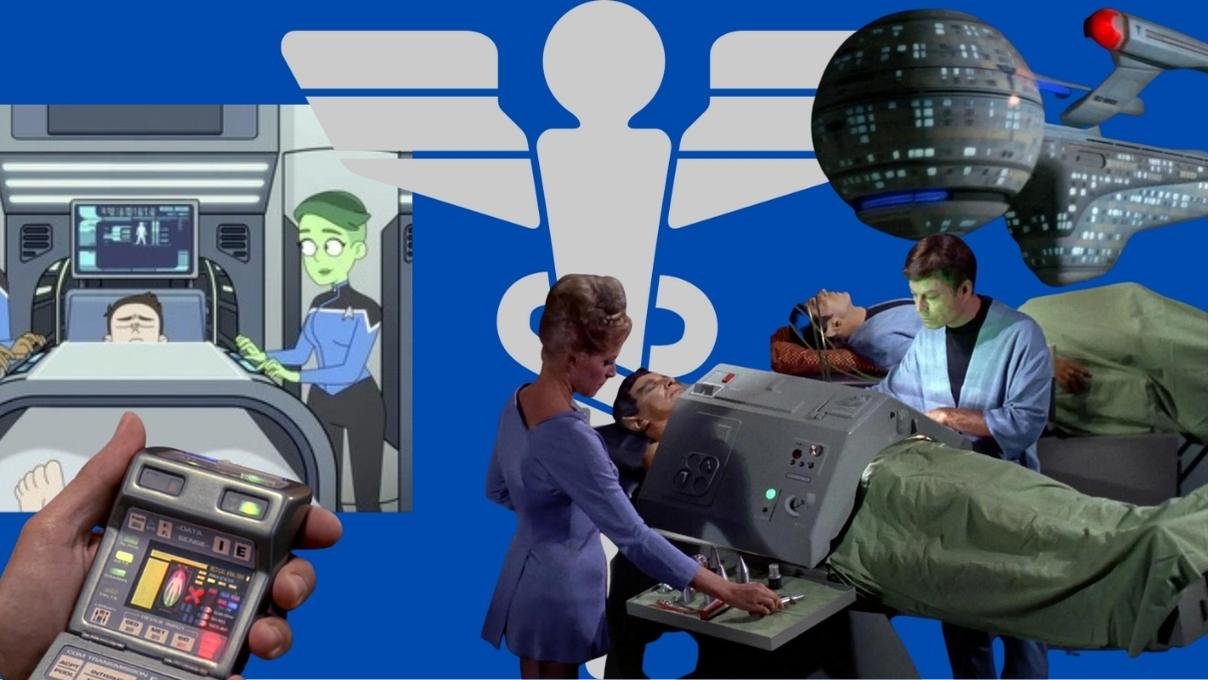T's Trek Trivia Tuesday: "The Spy Who Beamed Me (Up)"

Representing the spies of STAR TREK: Koval of the Tal Shiar (John Fleck); Fleet Admiral Marcus of Section 31 (Peter Weller); Enabran Tain of the Obsidian Order (Paul Dooley); Julian Bashir and Hippocrates Noah of the Holosuite (Alexander Siddig and Avery Brooks)
Star Trek has done its share of espionage storylines. Whether it’s Doctor Bashir James Bonding his way through a holodeck adventure, or the Obsidian Order covertly keeping an eye on Cardassia and their enemies, Trek makes it clear that Gene Roddenberry’s utopian future has a few dark corners. So park your Aston Martin in a secure location and put your shoe phone on “silent” while you prove you have what it takes to be a super-spy in today’s Trek Trivia.
The Star Trek: The Original Series episode “The Enterprise Incident” opens with Doctor McCoy voicing his concerns about Captain Kirk in a medical log. It seems the captain is not quite himself these days, acting erratically. When he orders the Enterprise into the Romulan Neutral Zone for no good reason, the entire crew thinks he’s lost his marbles. But then a Romulan vessel decloaks and nabs our heroes. Kirk and Spock beam over to have it out with its Commander.
Then things go from bad to worse. Seemingly tempted by the Romulan Commander’s feminine wiles, Spock turns on his commander and friend, selling him out to their adversaries. Kirk attacks his first officer, who uses the Vulcan death grip on the captain’s face, rendering Jim…well, dead. “But wait,” you say. “There’s no such thing as the Vulcan death grip.” McCoy agrees with you and brings Kirk’s “body” back to the Enterprise to revive him, not the first time the captain’s death was faked in TOS.
Turns out Kirk and Spock were working under orders from Starfleet intelligence. The human’s erratic behavior and the Vulcan’s betrayal were all part of a plan to get aboard a Romulan spacecraft while giving Starfleet and the Federation plausible deniability.
What was it the Federation wanted from the Romulans?
Captain Kirk (William Shatner) infiltrates a Romulan vessel in STAR TREK’s “The Enterprise Incident”
Off-screen, the Romulan Star Empire and Klingon Empire had become allies. This led to a sharing of technology. The ship Kirk and Spock infiltrate is of Klingon design, but some of the tech inside it is 100% Romulan, such as the cloaking device. Romulan cloaking devices had nearly stymied our intrepid crew before, but this is a new design, impervious to tracking sensors. Like a small boy who covets his friend’s new ball, Starfleet wants that technology.
Kirk returns to the enemy ship in the guise of a Romulan officer, stealing the cloaking device and making his escape before he can be stopped. Spock also escapes, with an unexpected and accidental bonus: a Romulan prisoner, in the form of the Romulan Commander.
For such a seemingly open and friendly organization, the Federation sure has a dark side. Take Section 31, for instance. They claim to protect the interests of Earth and the Federation, but they have a funny way of doing it. We first met an agent of this shadowy organization in Star Trek: Deep Space Nine when Luther Sloan attempted to recruit Julian Bashir. Happily, the good doctor declined.
We have since learned that Section 31 existed long before DS9. They popped up in Star Trek: Enterprise, Star Trek: Discovery, and even got a name-check in Star Trek: Lower Decks, when we learned that operatives speed-walk to conserve energy. They also exist in the Kelvin timeline, where they attempted to make Khan Noonien-Singh an ally, earning his ire instead. Or perhaps that should be his wrath.
Clearly, the idea of Section 31 is the antithesis of what the United Federation of Planets stands for. But where did its name come from?
Section 31 operative Harris (Eric Pierpoint) contacts Malcolm Reed (Dominic Keating) in STAR TREK: ENTERPRISE’s “Affliction”
The original Starfleet Charter made allowances for bending Starfleet regulations in “times of extraordinary threat.” This language appeared in Article 14, Section 31, hence the name, although it would appear that, like many ideas sanctioned to protect the people, it was taken to unfortunate extremes.
Bashir. Julian Bashir. In the DS9 episode “Our Man Bashir,” we learn that the good doctor has a yen for being a super-spy. When Garak crashes the holosuite party, he utters those fateful words: “After all, what could possibly go wrong?”
The pair find out in short order when the holo-program characters start to look like members of DS9’s command crew. Kira is a Russian femme fatale; O’Brien is a one-eyed menace; Dax is a beautiful scientist working for the enemy (named Honey Bare;) Worf is a wrinkly-headed henchman; and Sisko is the evil genius Hippocrates Noah. The whole cast seems to be having a blast in the episode, but Avery Brooks seems to take particular relish in his portrayal of Noah, whose plan is as over-the-top as his acting. Noah’s plan is to reduce the Earth’s surface, using lasers that will create fissures, which will release lava. Why? If you need to ask that question, you’ve clearly never watched a James Bond film.
Technobabble notwithstanding, the reason the crew ends up in the holodeck program is almost as nonsensicle and Noah’s scheme. How did it happen?
Julian Bashir (Alexander Siddig) isn't thrilled when Garak (Andrew Robinson) crashes his holo-program in STAR TREK: DEEP SPACE NINE’s “Our Man Bashir”
Sisko, Kira, Worf, Dax, and O’Brien were en route to DS9 from a conference when they discovered their runabout had been sabotaged. Eddington attempted to beam them off the tiny ship as it exploded, overloading the energizing coils and stranding the crew in the pattern buffer. All those people with their brains and stuff simply won’t fit in the buffer for long and they run the risk of fading from existence, so Eddington has their patterns transferred…to the holosuites.
Bashir and Garak can’t shut down or leave the holo-program, lest the crew’s patterns are wiped clean, so they have no choice but to play out the holonovel without killing their friends.
What if Captain Picard had been killed off of Star Trek: The Next Generation? How would the crew react? How would the show move forward? That’s the perspective from which Christopher Hatton and Naren Shankar wrote the first half of “Gambit, Part 1.” Picard is reported dead in the episode’s teaser and Patrick Stewart doesn’t show up until the end of Act Three, when Riker, taken prisoner by the mercenaries who reportedly killed the captain, comes face-to-face with him on the pirates’ ship.
Fortunately, Riker’s poker face is second-to-none and he apparently has a background in improvisational theater, because he yes-ands the heck out of his intital interaction with the captain. Picard, it seems, has infiltrated the mercenary crew under the assumed name of Galen (a reference to his archaeology professor, whom we met in an earlier episode) in order to discover why they are searching for specific Romulan artifacts.
Do you have any idea what the mercenaries are searching for, and why?
Riker (Jonathan Frakes) and Picard (Patrick Stewart) go over the plan in STAR TREK: THE NEXT GENERATION’s “Gambit, Part 1”
It turns out there’s more than one person aboard the ship claming to be something they’re not. The Romulan Tellera reveals to Picard that she is actually a Vulcan intelligence officer and that the mercenaries are after fragments of the Stone of Gol, a powerful sonic resonator that focuses and amplifies telepathic energy. It could be used as a powerful weapon, and she believes a Vulcan isolationist group is in the market for it.
At the eleventh hour, we learn that Tellara is a member of that Vulcan isolationist group, intent on stealing the ancient weapon. She does just that, but finds that it is the embodiment of “you get what you give.” As long as one has peaceful thoughts and intentions, the artifact can’t work against them.
This post will self destruct in 10 seconds…
T is the Managing Editor for Daily Star Trek News and a contributing writer for Sherlock Holmes Magazine and a Shakespeare nerd. He may have been the last professional Stage Manager to work with Leonard Nimoy, has worked Off-Broadway and regionally, and is the union Stage Manager for Legacy Theatre, where he is currently working with Julie Andrews. after which he’ll be working on Richard III at Elm Shakespeare Company.










